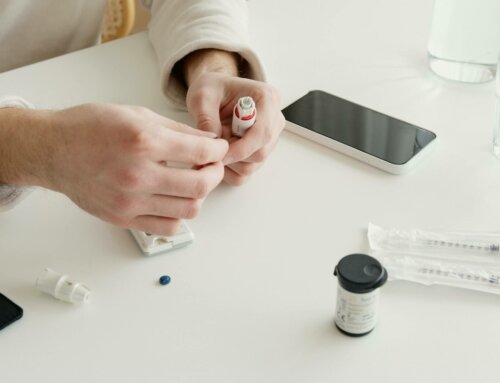As a mental health counselor I am in the business of helping people see their strengths, adapt to changes, and learn to thrive with sometimes very challenging situations and conditions. As a person with type 1 diabetes, I learned at an early age the importance of making healthy choices and have also survived through many incidents that occurred directly due to making unhealthy choices.
Like the 3 times I have needed the assistance of trained medical personnel to get me enough glucose to snap out of a hypoglycemic reaction. However, for the most part I feel the greatest strength I have when it comes to maintaining a healthy life with diabetes for 26 years is staying motivated to keep my blood sugar levels as “in control” as possible. This article is written with the full appreciation for the complexities of this terrible disease and is an attempt to help both those with diabetes and those who assist persons with diabetes to understand the importance and the role of motivation in the management of diabetes.
When I was diagnosed with diabetes in 1975, at the age of 14, I considered myself lucky to be alive as did my parents and doctors as my blood sugar had risen to an astronomical 1600. I was in a diabetic coma for some time, two to three days, I think. I was most fortunate to be surrounded by a loving family and caring community that allowed me to reestablish a near normal adolescents despite having a life-threatening disease. I am eternally grateful for the care I received at that time from my family, friends, and medical personnel as it taught me the significance of being connected to others.
One special person in my life at the time of my diagnosis with diabetes was legendary college basketball coach Jim Valvano. Jim was a young coach at Bucknell University and had adopted me as a ball boy for his exciting college basketball team. Jim went on to become a famous coach doing well at Iona College then becoming legendary by guiding his 1983 North Carolina State Wolfpack to a stunning upset of favored Houston in the NCAA title game. Jim was able to visit me at the hospital when I was recovering from being informed I had this disease that I knew nothing about. His visit inspired me because he really cared and let me know it was not such a big deal and that I would be able to do anything if I really wanted to. His own personal fight against cancer years later showed the level of motivation this amazing man had. Jim’s spirit lives on in the V Foundation which is a non-profit group that works towards a cure for cancer. His motto in his fight against cancer was “never give up.”
This same spirit to “never give up” must be an intrinsic value of persons living with diabetes. By staying motivated to control blood sugar levels through proper diet, exercise, medication and/or insulin management, and stress management the person with diabetes has a great chance to control diabetes rather than to let it control them.
The Behavior/Control Connection
Diabetes is a disease that is greatly affected by the behavior of the person who has it. Motivation and attitude play a key role in the patients self-care. The need to monitor and regulate the day to day regimen of health diabetes care is paramount in achieving and maintaining optimum control. Patients must understand the significance of their blood sugar results and comprehend and use the connection of their behavior and the results of their blood sugar results. Granted, many complicating factors can aggravate ideal blood sugar results, however, personal behavior is a fundamental cornerstone of diabetes care that is often not talked about or addressed at the level required. This often occurs because patients are hesitant to “tell the whole truth” and doctors are often too busy to ask probing questions that might give insights to the patients behavioral challenges as related to diabetes self care.
Part of any complete diabetes care team should include a counselor or psychologist to aid the patient in exploring this behavior/control connection. Just as we assume the importance of a dietitians role in diabetes education, we should also offer behavioral consults for both patients and their families and to the professionals who serve them.
The Role of Motivation in Diabetes Care
An individual with diabetes must be motivated to do many things. Lets look at just some of the basic self-care issues that are part of a diabetic plan:
1. Blood Sugar Testing. Unless you’ve been living on a deserted island away from civilization, your’e aware of the critical importance of blood sugar control. Ideal pre and post meal levels should be communicated with the patient. Goal setting is a fundamental behavioral component of this procedure. The patient must “buy in”to the notion that gaining control is possible and that the only person capable of controlling the results to get him to drink. How then do you motivate the unmotivated? The person who just does not seem to care or who has tried everything but just keeps falling into bad habits. How do we help someone who does not want to help themselves? Well the truth is inspiring others is a great gift that diabetes educators and doctors can instill in patients. Yes, they are responsible for their own behavior but we do play an important role in reaching them, educating them, and motivating them.
Words of encouragement and honesty are extremely meaningful. In addition, having a good working relationship with a certified counselor or psychologist that specializes in diabetes is a good way to get some insights into the role of behavior and emotions for persons who live with it.
Famous Motivational Quotes
Here are some quotes that help us to think of the possibilities rather than the limits of diabetes:
“Genius without education is like silver in the mine.” Ben Franklin
“When people are highly motivated, it is easy to accomplish the impossible. And When they aren’t it’s impossible to accomplish the easy”. Bob Collings
“Failure to prepare is preparing to fail.” Unknown
“You are not what you think you are. But what you think – YOU ARE!” Norman V. Peale
“Self-pity is an acid which eats holes in happiness.” Earl Nightengale
“If you think diabetes is bad you need to visit an intensive care or cancer unit. Count your blessings and be truly thankful for life.” Phil Eager
“There was once was a dog who boasted to his canine friends that he could run faster than anyone. One day he chased a rabbit and failed to catch it. His friends ridiculed him. “All right” said the dog, “I did not make good on my boast. But remember, the rabbit was running for his life and I was running for my dinner.” Unknown
Let’s try to remember that the person with diabetes is truly fighting for their life by the behaviors and habits they form.






Leave A Comment